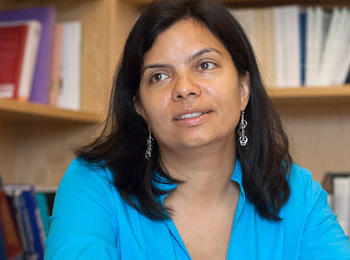Grantee Spotlight: Katherine Briant, MPH, CHES - Bridging Community Cancer Education Efforts with Health Disparities Research
, by CRCHD staff
Every day brings new opportunities to support community outreach and research as Katherine Briant, M.P.H., C.H.E.S. endeavors to improve the health of disparity communities in the state of Washington.
Briant is a Community Health Education Manager at the Fred Hutchinson Cancer Research Center in Seattle, Washington. As a Community Health Educator (CHE) that is part of NCI’s National Outreach Network (NON), she bridges NCI-supported outreach and community education efforts with cancer health disparities research and training programs. As a liaison among researchers, partners, and the community, she identifies areas of need, and then develops and disseminates health promotion and cancer education materials that are tailored to the needs of underserved communities.
She is currently involved in several NCI and CRCHD grants, including a Community Networks Program Center (CNPC) U54 grant aimed at reducing cancer disparities among Hispanics and Native Americans in the Lower Yakima Valley of Washington State. Briant also supports supplements to Fred Hutchinson’s Comprehensive Cancer Center Support P30 grant and a U54 Partnerships to Advance Cancer Health Equity (PACHE) grant.
Through these grants, Briant has been involved in multiple cancer education and research projects. The CNPC Briant works with is located in a rural, agricultural area of Washington State that is mainly populated by Hispanic farmworkers and Native Americans. Briant and her fellow researchers recently held two town hall forums as part of a needs assessment to determine what cancer education was necessary in the area. They determined that the Hispanic and Native American communities were most interested in information about colon cancer, followed by breast cancer. As a result of this assessment, Briant worked with field staff to develop a program to increase colon cancer awareness. The main component of their program was a giant inflatable colon designed to educate about colorectal cancer. The colon was displayed at 47 community events where field staff led the community on tours of the colon. Pre- and post-tests were given to those that walked through the colon to determine a change in knowledge about colon cancer. In addition, participants over 50 years old were offered a free fecal occult blood test (FOBT).
The response by these two underserved groups was overwhelming. Approximately 3,500-4,000 people walked through the colon, 947 individuals completed both pre-and post-test questionnaires, 300 FOBT kits were distributed, and 226 FOBT kits were returned. The questionnaires indicated increases in knowledge and awareness of colon cancer and screening. Additionally, Briant said that “when we look at increases in knowledge, we’re actually seeing that the Hispanic and Native Americans are getting bigger increases in knowledge from pre to post (before and after they walk through the colon) then the white participants.” Briant published a scientific paper describing this project in the July 2014 Journal of Cancer Education.
Briant has also worked to meet the Hispanic and American Indian communities’ needs for breast cancer information and education. Briant revised pieces of Cancer 101: A Cancer Education and Training Program for American Indians and Alaska Natives (Cancer 101) to tailor it as a flip chart for small group education. Trained health providers are using this tool at “home health parties” where they go to a home and provide breast cancer education to a group. “It’s sort of like a Tupperware party but has cancer education instead,” Briant said. They have done pre- and post-test assessment and currently 120 women have participated. Briant has just begun to start analyzing this data.
An additional project that Briant recently worked on was through a supplement to Fred Hutchinson’s main cancer center grant from NCI. Briant organized a two-day grant-writing workshop with local organizations. Out of that workshop, four community-based organizations were funded. Briant is the point of contact for these grantees and assists them with their programs.
Gilda’s Club was funded in order to evaluate whether attending Camp Sparkle, a week-long summer camp for children whose lives have been touched by cancer, improves the emotional health of the children. The evaluation is being conducted in collaboration with a mentor researcher at Fred Hutchinson. The study is designed to compare pre- and post-camp levels of depression, anxiety and social support among 80 camp attendees versus 40 children touched by cancer who choose not to attend camp.
Another organization funded after the grant workshop was the Cierra Sisters Inc. Their program involves physician lectures and a mobile mammogram screening unit in order to reduce fears around mammograms and promote breast cancer screening in African-American women. The two other grantees are working to make stomach cancer prevention a priority among Asian-Americans and to study leadership development among HIV-positive Latinos.
Briant began her work in the field of cancer 17 years ago as a Physician Office Assistant for a surgical oncologist at Memorial Sloan-Kettering Cancer Center in New York City. After that position Briant worked for NCI’s Cancer Information Service as an Information Specialist and Partnership Program Coordinator at Memorial Sloan-Kettering Cancer Center. She then joined the Cancer Information Service at Fred Hutchinson Cancer Research Center as a Partnership Program Manager.
Briant received her B.A. in 1997 Environmental Science with a minor in International Relations from the College of Arts & Sciences, Boston University. She earned her Masters of Public Health in 2002 from Hunter College, City University of New York.
She has earned several awards for her work including the R. Davilene Carter Presidential Prize for best manuscript (2009), the Spirit of the NCI’s Cancer Information Service Award (2007), and the Indian Health Service National Director’s Award (2005).
